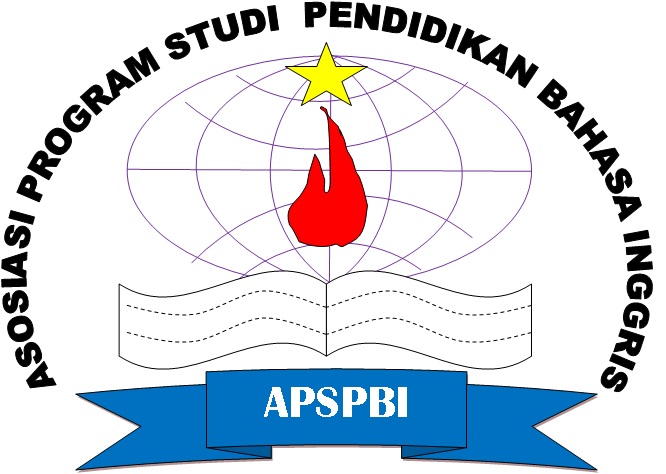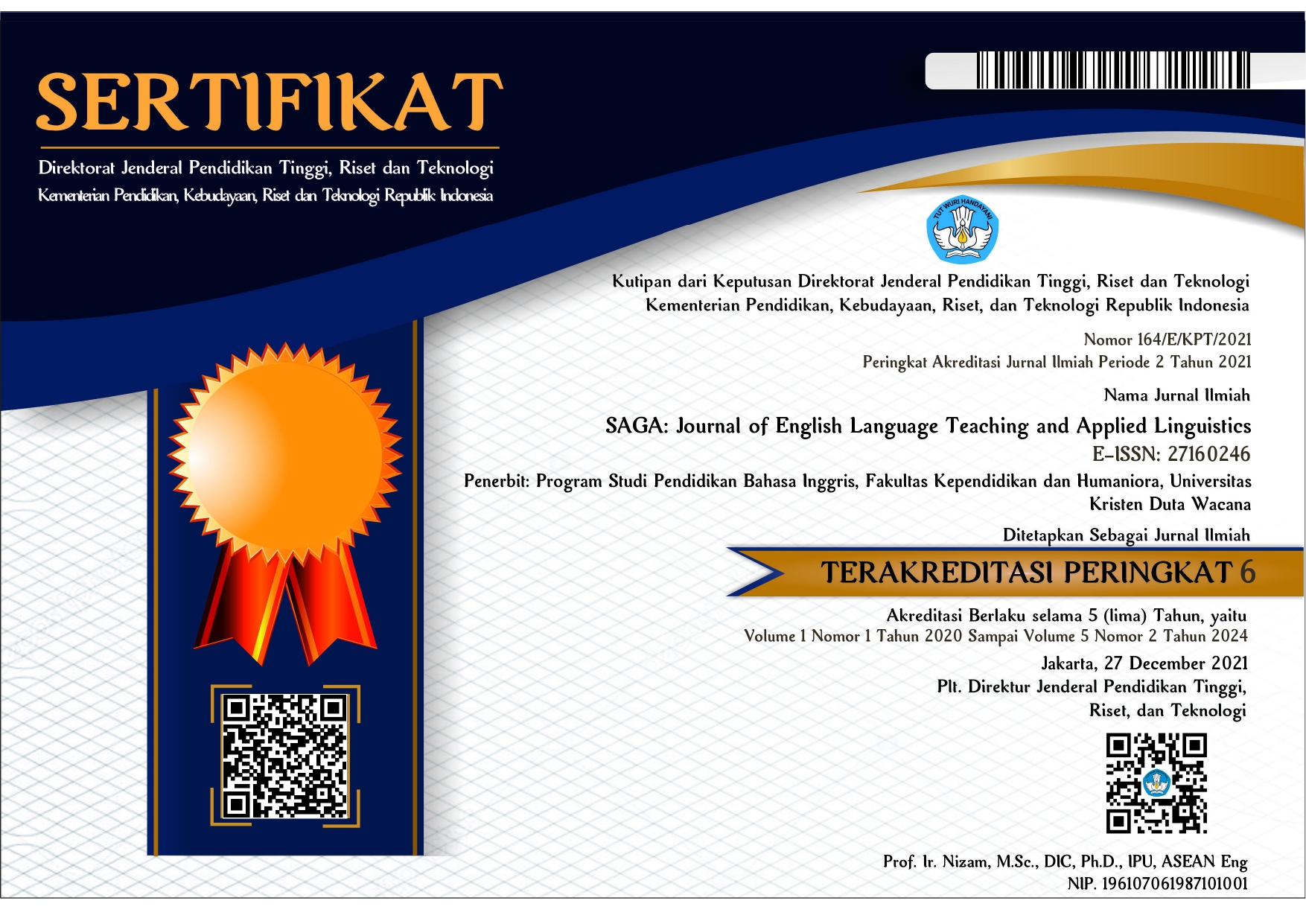Enhancing Indonesian EFL Learners’ Speaking Skills through Digital Storytelling based on Local Folktales
DOI:
https://doi.org/10.21460/saga.2024.52.190Keywords:
speaking skill; digital storytelling; local folktales; technology in education; integrating local culture into teachingAbstract
This study investigates the effectiveness of enhancing Indonesian English as a Foreign Language (EFL) learners’ speaking skills through digital storytelling grounded in local folktales. The study, which was conducted among first-year university students at Universitas Bumi Persada consisting of 8 people, used a case study. The information was gathered by observing the lecturer who integrated both digital storytelling and local folktales into her instruction in the classroom. To gain more comprehensive data and in-depth information, students were also interviewed regarding their experiences and opinions. The study explores the integration of digital storytelling techniques with traditional local folktales to foster speaking proficiency among EFL students. The research intends to provide significant insights into creative language teaching methodologies by leveraging technology and local culture. The findings show that digital storytelling has a considerable impact on students' speaking ability, providing light on the possibilities of adding culturally rich narratives into language teaching. This study adds to the pedagogical discourse by highlighting the potential of digital storytelling as a catalyst for enhancing speaking abilities, particularly among EFL university students in Indonesia.
References
Afshar, H. S. (2021). Task-related focus-on-forms foreign language vocabulary development: Focus on spoken form and word parts. System, 96, 102406. https://doi.org/10.1016/J.SYSTEM.2020.102406
Ahmad, W. I. W., & Yamat, H. (2020). Students’ perception on learning English language through conventional and digital storytelling. International Journal of Academic Research in Business and Social Sciences, 10(2), 484–504. https://doi.org/10.6007/ijarbss/v10-i2/6945
Arroba, J., & Acosta, H. (2021). Authentic digital storytelling as an alternative teaching strategy to develop speaking skills in EFL classes. LEARN Journal: Language Education and Acquisition Research Network, 14(1), 317–343.
Ayten, B. K., & Polater, C. (2021). Values Education Using the Digital Storytelling Method in Fourth Grade Primary School Students. International Journal of Education and Literacy Studies, 9(2), 66. https://doi.org/10.7575/aiac.ijels.v.9n.2p.66
Banaruee, H., Farsani, D., & Khatin-Zadeh, O. (2023). Culture in English language teaching: A curricular evaluation of English textbooks for foreign language learners. Frontiers in Education, 8. https://doi.org/10.3389/feduc.2023.1012786
Chambers, G. J., & Yunus, M. M. (2017). Enhancing Learners' Sentence Constructions via" Wheel of Grammar". Pertanika Journal of Social Sciences & Humanities, 25(4).
Chen, J. C., & Kent, S. (2020). Task engagement, learner motivation and avatar identities of struggling English language learners in the 3D virtual world. System, 88, 102168. https://doi.org/10.1016/J.SYSTEM.2019.102168
Hamied, F.A. (2017). Research methods: A guide for first time researchers. Bandung: UPI Press.
Haselow, A. (2021). The acquisition of pragmatic markers in the foreign language classroom: An experimental study on the effects of implicit and explicit learning. Journal of Pragmatics, 186, 73–86. https://doi.org/10.1016/J.PRAGMA.2021.09.017
Ho, Y. Y. C. (2020). Communicative language teaching and English as a foreign language undergraduates’ communicative competence in Tourism English. Journal of Hospitality, Leisure, Sport & Tourism Education, 27, 100271. https://doi.org/10.1016/J.JHLSTE.2020.100271
Huang, L. J. D. (2021). Developing intercultural communicative competence in foreign language classrooms: A study of EFL learners in Taiwan. International Journal of Intercultural Relations, 83, 55–66. https://doi.org/10.1016/J.IJINTREL.2021.04.015
Kurniawati, L. A., & Malasari, S. (2022). Local wisdom in designing ESP for community-based tourism practitioners: A study of needs analysis. SAGA: Journal of English Language Teaching and Applied Linguistics, 3(2), 147–162. https://doi.org/10.21460/saga.2022.32.135
Liu, S., & Kinginger, C. (2021). The sociocultural ontogenesis of international students’ use of pragmatic strategies in ELF academic communication: Two contrasting case studies. Journal of Pragmatics, 186, 364–381. https://doi.org/10.1016/J.PRAGMA.2021.10.022
Moser, M., Zimmermann, M., Pauli, C., Reusser, K., & Wischgoll, A. (2022). Student’s vocal participation trajectories in whole-class discussions during teacher professional development. Learning, Culture and Social Interaction, 34, 100633. https://doi.org/10.1016/J.LCSI.2022.100633
Ninawati & Wahyuni, N. (2020). Efektivitas bahan ajar berbasis kearifan lokal terhadap kemampuan literasi menulis siswa sekolah dasar. Jurnal Pemikiran dan Pengembangan Sekolah Dasar (JP2SD), 8(1), 51-59. http://ejournal.umm.ac.id/index.php/jp2sd
Nuriyah, L. (2023). Using the flipped classroom model to enhance English speaking skills through digital storytelling. Jurnal Visi Ilmu Pendidikan, 15(1), 10-18. http://jurnal.untan.ac.id/index.php/jvip
Poonpon, K. (2011). Enhancing English skills through project-based learning. The English Teacher, 11, 1-10. https://www.researchgate.net/publication/324972858_Enhancing_English_skills_through_project-based_learning
Prayudha.S, J. (2023). Inserting Local Wisdom In English Material: Strategies and Benefits. Foremost Journal, 4(2), 77-86. https://doi.org/https://doi.org/10.33592/foremost.v4i2.3704
Sabari, N. A. S., & Hashim, H. (2023). Sustaining Education with Digital Storytelling in the English Language Teaching and Learning: A Systematic Review. International Journal of Academic Research in Business and Social Sciences, 13(4), 214 – 231.
Sembiring, D. L. B., & Simajuntak, D. C. (2023). Digital Storytelling as an Alternative Teaching Technique to Develop Vocabulary Knowledge of EFL Learners. Journal of Languages and Language Teaching, 11(2), 211-224. https://e-journal.undikma.ac.id/index.php/jollt
Shi, Y., & Lei, L. (2021). Lexical use and social class: A study on lexical richness, word length, and word class in spoken English. Lingua, 262, 103155. https://doi.org/10.1016/J.LINGUA.2021.103155
Subekti, A. S. (2018). An exploration of foreign language anxiety in the Indonesian university context: Learners’ and teachers’ voices. TEFLIN Journal, 29(2), 219–244. https://journal.teflin.org/index.php/journal/article/view/590
Subekti, A. S. (2020a). Alleviating anxiety, boosting confidence: A proposed model of Willis’ Task-Based Learning. JELTL (Journal of English Language Teaching and Linguistics), 5(1), 131–144. https://doi.org/10.21462/jeltl.v5i1.396
Subekti, A. S. (2020b). Self-perceived communication competence and communication apprehension: A study of Indonesian college students. EduLite: Journal of English Education, Literature, and Culture, 5(1), 14–31. https://doi.org/http://dx.doi.org/10.30659/e.5.1
Sun, M., Wang, M., Wegerif, R., & Peng, J. (2022). How do students generate ideas together in scientific creativity tasks through computer-based mind mapping? Computers & Education, 176, 104359. https://doi.org/10.1016/J.COMPEDU.2021.104359
Vonkova, H., Jones, J., Moore, A., Altinkalp, I., & Selcuk, H. (2021). A review of recent research in EFL motivation: Research trends, emerging methodologies, and diversity of researched populations. System, 103, 102622. https://doi.org/10.1016/J.SYSTEM.2021.102622
Wahyuni, Sujoko, & Sarosa, T. (2018) Improving students’ speaking skill through project-based learning (digital storytelling). English Education Journal, 6(2), 161-168. https://doi.org/10.20961/eed.v6i2.35943
Zhang, S., Gao, Q., Sun, M., Cai, Z., Li, H., Tang, Y., & Liu, Q. (2022). Understanding student teachers’ collaborative problem solving: Insights from an epistemic network analysis (ENA). Computers & Education, 183, 104485. https://doi.org/10.1016/j.compedu.2022.104485
















